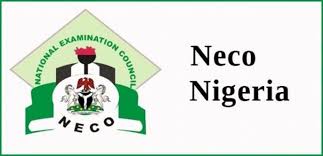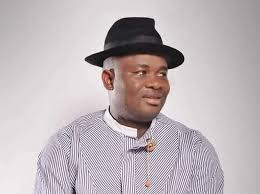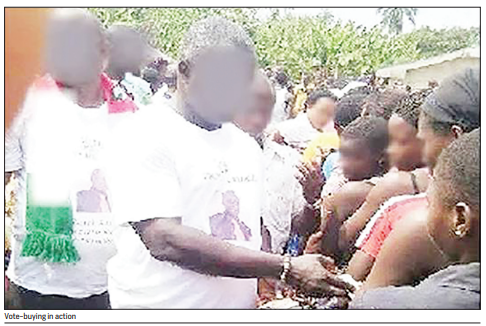- How to curb vote-buying during elections, by lawyers
Lawyers have expressed deep concerns over the damaging effects of the recurring cases of vote-buying on the nation’s electoral process. As a way out of the menace, the men of the wig and gown called for an enhanced voter sensitization and education. AKEEM NAFIU reports
Some senior lawyers have decried the unabated cases of vote-buying during elections in the country, saying the illegal act is impacting negatively on the electoral process. The lawyers while noting that vote-buying distorts the aim of an election, with regards to the determination of the choice of people, called for an enhanced voter education and sensitization to tackle the menace.
The menace recently reared its ugly head in the just concluded governorship election in Anambra State. Speaking on the issue, a civil society organisation, Citizen Monitors, called for a thorough probe of the widespread allegations of vote-buying in the Anambra State governorship election. In a statement, the group expressed deep concerns over the growing normalization of votebuying in Nigeria’s electoral process.
It noted that despite the seeming calmness and orderliness of the Anambra guber poll, there were reports of widespread financial inducements around polling units. “The semblance of a peaceful process should not be mistaken for a credible one. A calm election is not the same as a credible election. You can have neat queues, working machines and signed result sheets, yet still run a process where the real contest is who can buy people’s despair the cheapest”, the statement reads.
Speaking on the menace, the cofounder of Citizen Monitors, Adeshope Haastrup, said: “the increasing acceptance of vote-buying as a normal feature of elections threatens the integrity of democracy. “We cannot pretend that normalised vote buying is democracy. If we quietly accept this pattern, we are not just electing leaders; we are choosing the kind of country our children must struggle in”.
APGA’s denial
In the meantime, the National Chairman of the All Progressives Grand Alliance (APGA), Sly Ezeokonwa, has dismissed allegations that the party engaged in vote buying to win the the recently conducted governorship election in Anambra State. In a media chat, Ezeokonwa described the claims as “shocking,” saying APGA neither had the financial capacity nor the resources to influence voters through monetary inducement.
He queried how APGA, without federal backing or vast financial resources, could be accused of vote buying when rival political parties had access to far greater funding. “The claim that the ruling party was involved in vote buying, I do not agree.
I think the best way to describe it is shocking, shocking in the sense that I do not understand the deep pocket that APGA had to control the resources to generate the number of votes that we did. “There is a hypothesis we tested in this election, and that was to see how much the politics of development can translate into what the governor calls political capital.
Candidates who benefit from vote buying should be penalized by law
From our campaign trajectory, we saw that when development is brought to the people, they, in turn, show ownership of the process. “The communities organised themselves, rented canopies, stages, and invited the governor to come speak about his impact. At the end of the day, they gathered their legal resources and donated in aid of the campaign. That is what I call ownership. We have never witnessed such a thing in this country”, he said.
SERAP’s threat
Despite the APGA National Chairman’s denial, a rights organization, the Socio-Economic Rights and Accountability (SERAP) has called for a thorough probe of the widespread allegations of vote buying in the Anambra guber poll.
In a letter dated November 8, 2025 and signed by its Deputy Director, Kolawole Oluwadare, SERAP urged the INEC Chairman, Prof. Joash Ojo Amupitan (SAN), to urgently refer the allegations of vote-buying and undue influence during the Anambra guber poll to appropriate anticorruption agencies and the police for investigation and prosecution of perpetrators and their sponsors.
The rights organisation urged Amupitan to work closely with ICPC, EFCC and the police to identify, name and shame the suspected perpetrators and their sponsors and ensure their effective prosecution. The group threatened to pursue legal action should the INEC chairman failed to heed its call.
The letter reads: “Referring the perpetrators and sponsors of vote buying and undue influence in Anambra to appropriate anticorruption agencies and police for investigation and prosecution would improve public trust in the ability of your leadership of INEC to ensure free and fair elections in Nigeria. “It would also be consistent with INEC’s mandates under the Electoral Act and the letter and spirit of the Nigerian Constitution 1999 [as amended]. “Electoral integrity is critical to a legitimate democracy. When the integrity of that process is compromised, the legitimacy of our government and the public confidence in our public institutions is seriously undermined.
“Reports of electoral bribery, vote buying and undue influence in Anambra state have shown that INEC and politicians have learnt little or nothing from the well-documented problems during the 2023 general election. “We would be grateful if the recommended measures are taken within seven days of the receipt and/or publication of this letter. If we have not heard from you by then, SERAP shall take all appropriate legal actions to compel you and INEC to comply with our request in the public interest.”
Vote-buying during 2023 elections
The National Bureau of Statistics (NBS) in a report titled; “Corruption in Nigeria: Patterns and trends, third survey on corruption as experienced by the population”, revealed that there was a prevalence of vote-buying and selling during the 2023 general election. While describing vote-buying as another form of corruption, the NBS said the 2023 general election recorded 22 per cent of vote buying, which is five per cent higher than the 2019 general election with 17 per cent.
NBS added that its survey also revealed that some of the electorates were not influenced by their voting decisions, even after collecting money or favour. The report indicated that the survey revealed that 22 per cent of Nigerian citizens reported that they were personally offered money in exchange of a vote before or during the 2023 general election, while nine per cent were offered another favour.
“This represents an increase in both types of vote-buying compared with 2019 when personal offers of money were reported by 17 per cent and personal offers of other favours were reported by four per cent of citizens. “Furthermore, in 2023, 10 per cent reported that they were not personally offered money or another favour in exchange for their vote, but that instead another member of their household was approached, compared to 5 per cent in 2019.
“Just over half (55 per cent) of the citizens who were personally offered money or another favour in exchange for their vote in the 2023 general election reported that the offer did not influence their vote choice, while 40 per cent of those citizens said they voted for the person or political party which offered them money or a favour precisely because of the offer. “Between 2019 and 2023, the proportion of Nigerians who were personally offered bribes in exchange for votes increased similarly across sexes, urban and rural areas, and age groups”, NBS said.
Legislation against vote-buying
The Electoral Act, as it is presently constituted, stipulates some form of punishment for such electoral malpractice, including votebuying and vote-selling.
For instance, Section 121 (2) of the Electoral Act, 2022, states that a: “voter commits an offence of bribery where, before, or during an election, directly or indirectly, by his or herself, or by any other person, on his or her behalf, receives, agrees, or contracts for any money, gift, loan, or valuable consideration, office, place of employment, for himself or herself, or any other person, for voting or agreeing to vote, or for refraining or agreeing to refrain from voting at any such elections”.
Section 127 stated thus: “A person who —(a) corruptly by his or herself or by any other person at any time after the date of an election has been announced, directly or indirectly gives or provides or pays money to or for any person to corruptly influence that person or any other person to vote or refrain from voting at such election, or on account of such person or any other person having voted or refrained from voting at such election; or (b) being a voter, corruptly accepts or takes money or any other inducement during any of the period stated in paragraph (a), commits an offence and is liable on conviction to a fine of N100,000 or imprisonment for a term of 12 months or both”.
Lawyers speak
Speaking on the damaging effect of vote-buying on the electoral system and the way out, a Professor of Law and Senior Advocate of Nigeria (SAN), Awa Kalu, said, “Vote-buying distorts the aim of an election, namely, the determination of the choice of the people. “So, if you see a man who is hungry and has come out to vote, before you leave your house to vote, you already know who you want to vote for.
“Then when you now get to the venue and somebody says, look, vote for me or vote for us, or X, Y, Z as the case may be, this is your 20k, this is 10k, even 2k can change somebody’s intention. “So you don’t need rocket science to know that such an act is against the law. It distorts the choice a person wants to make.
The way forward is to allow democratic choice to flourish”. Another SAN, Afolabi Olatunde, who expressed sadness that the menace has remained with Nigerians, argued that when people’s votes are gotten through indecent means, the nation will not have a very robust electoral process.
Olatunde said: “And more often than not, if people voted because they collected money, perhaps the man who emerged at the end of the day wouldn’t have emerged from the decision of right-thinking members of the society. “It is unfortunate, it is immoral and it is something that should not be encouraged.
Electorates should be sensitized on the dangers of votebuying
Now, when you talk about what is to be done to curtail these realities or these occurrences, I think there is a need to sensitise members of the public, to let them appreciate the fact that when you want to choose your leaders, you should be able to decide without being induced by monetary consideration.
“More often than not, those people that collected money and voted for a particular candidate, you realise the fact that they care less about whatever vision that candidate has and whatever manifesto the candidate has put forward to them.
“So, I think it has to do with some measure of enhanced voter sensitisation and education. “And of course, the National Orientation Agency (NOA) also has a responsibility to start here in educating the people that it does not do well for society to be voting because people give them money before they cast their ballot for any particular candidate”. In his comments, a Professor of Media Law and Mass Communication, Chief Fassy Yusuf, asked INEC to lobby the Federal Government and National Assembly for its own mechanism to arrest and prosecute vote buyers.
Yusuf said: “Until the Federal Government and National Assembly are willing to address the issue of vote-buying holistically, there would be no end to the menace because of greed and avarice. Our people are poor and hungry, while those that are not poor are selfish and are trying to exert their own pound of flesh from politicians. “But, at the end of the day, the society loses because credibility is not part of democracy.
So, INEC should lobby the Federal Government and National Assembly for its own mechanism to arrest, investigate and prosecute votebuyers. “One of the things INEC should do is to mount cameras near every polling booths. Policemen and other security agencies should also have body cameras to be able to picture and record individuals who are engaged in this nefarious practice. Until then, the practice of vote-buying will continue to rear its ugly head.
“Besides, voters education, by way of advocacy and sensitization should be pursued vigorously by the National Orientation Agency (NOA), INEC and other relevant bodies”. In his submissions, a rights activist, Kabir Akingbolu, said government should be more intentional in sensitizing the populace on the dangers of vote buying. “The problem of vote-buying is becoming an interactable menace in the nation’s electioneering process and INEC is helpless in this regard. We cannot blame INEC for the issue because the electoral body is not the one giving the money.
“So, as it is, government should be more intentional on the issue of sensitization and enlightenment of people about their rights, while citizens must also be wary of politicians antics.

It’s a shame that at this age and times, people are selling votes for as low as N1000″, Akingbolu said. In his views, a former National President of the Committee for the Defence of Human Rights (CDHR), Malachy Ugwummadu, noted that vote-buying is an offence prohibited and criminalized by the Electoral Act.
He said: “Vote-buying is an electoral offence expressly prohibited by the Electoral Act 2022 and in fact, criminalised by the same Act, thereby vesting the power to prosecute those offences in the election monitoring body. “The issue is whether the law enforcement agencies have risen to the occasion to stem this ugly trend, because whereas the Commission has the prosecutorial power, the law enforcement agencies reserve the right to arrest.
“Both Sections 121 and 127 of the Electoral Act, 2022 dealing with bribery and undue influence respectively condemn and criminalises any form of vote buying amongst other electoral offences. Section 145(2) empowers the Commission to prosecute electoral offence and bring dissidents and offenders to book. “Therefore, adequately resourcing and capacitating the Commission in this regard to vigorously and effectively prosecute offenders will serve as deterrent”.
Speaking in the same vein, a Lagos-based lawyer, Ige Asemudara, asked law enforcement agencies to rise up to their lawful duties and responsibilities of enforcing the law through investigation, arrest and prosecution of vote buyers. Asemudara said: “What should be done in law has been done. Legislations have been passed outlawing and criminalising votebuying.
It is the INEC and law enforcement agencies that should rise up to their lawful duties and responsibilities of enforcing the law through investigation, arrest and prosecution of offenders.
“We cannot have good laws and bad law enforcers and expect things to work. The government must ensure that the agencies work and the people must stamp their feet on the ground to demand enforcement of the laws. “The other aspect of it that we should also explore is that candidates who benefit from vote-buying should be penalised by law. Knowledge should be imputed to them by legal presumption.















